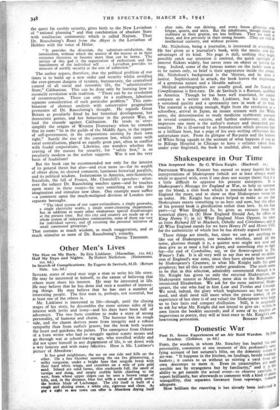Other Men's Lives
In Search of Complications. By Eugene de Savitsch, M.D. (Robert Hale. rzs. 6d.)
SEVERAL states of mind may urge a man to write his life story. He may be interested in himself, to the extent of believing that others must share his interest. He may be interested in life. He may believe that he has done and seen a number of interest- ing things. He may believe that he has met a number of interesting people. The first state is, perhaps, not essential, but at least one of the others is.
Mr. Linklater is interested in life—though, until the closing stages of his story, he dissembles the more serious sides of his interest with levity and irony—and his days have been full of adventure. The two facts combine to make a story of strong personality, of humour and charm. The humour has its rough side, and the charm derives more from integrity and a robust sympathy than from surface 'graces; but the book both warms the heart and quickens the pulses. The emergence from Orkney of a born writer who had to struggle against scanty means and go through war at school-leaving age, who travelled widely and did not spare himself in any department of life, is set down with a wry honesty and with many felicities. Here is Mr. Linklater's picture of Aberdeen :
It has good neighbours, the sea on one side and hills on the other. On a fine October morning the sea lies glimmering, a milky turquoise, under a bright haze that seagulls break with their hard white wings, and crumbles on a mile of pale gold sand. Inland are solid farms, thin stackyards full, the smell of turnips and dung, and empty stubble fields climbing to the west, from whose upper slopes can be seen a brown range of hills, and, in the distance, blue but with a streak of early snow, the broken blade of Lochnagar. The city itself is built of a rough and shining stone, a white city, rigorous and clean. As gay a sight as any town can offer is Aberdeen drying itself after rain, the sun shining, and every house glittering with felspar, quartz, and mica. But the inhabitants, though nearly as stubborn as their granite, are less brilliant. They are rural at heart, and live privately in their strong houses. .They are void of intellectual curiosity, and without passion.
Mr. Nicholson, being a journalist, is interested in everything. He has' given us a journalist's book, with the merits and dis- advantages of its kind. No page is dull, nothing that might possibly catch our attention is omitted, the quick spotlight of interest flickers widely, but never rests on object or person for long. Indeed, some of the famous names on the jacket seem to to be names only, so brief is their appearance inside the covers. Mr. Nicholson's background is the 'thirties, and he does it justice. Sophisticated in attack, the book leaves the impression of a generous nature and a likeable naivete.
Medical autobiographies are usually good, and In Search of Complications is first-rate. Dr. de Savitsch is a Russian, qualified in America. Though he has been well translated, he cannot compare as a writer with Mr. Linklater, but his story has a sustained quality and a spontaneity rare in work of its kind. The material is exciting enough, flight from the revolution as a schoolboy, arrival in Japan, an insane sojourn with the White army, the determination to study medicine stubbornly pursued in several countries, success, and further endeavour; vet what impresses one most is the author's mature and integrated per- sonality. He is ill-served by an Introduction which presents him as a brilliant bore, but a page of his own writing obliterates this unfortunate start. From its glimpse of Rasputin and the horrors of White firing squads to the account of what happens if you go to Billings Hospital in Chicago to have a- solinter taken from under your fingernail, the book is truthful, alive, and human.






























 Previous page
Previous page